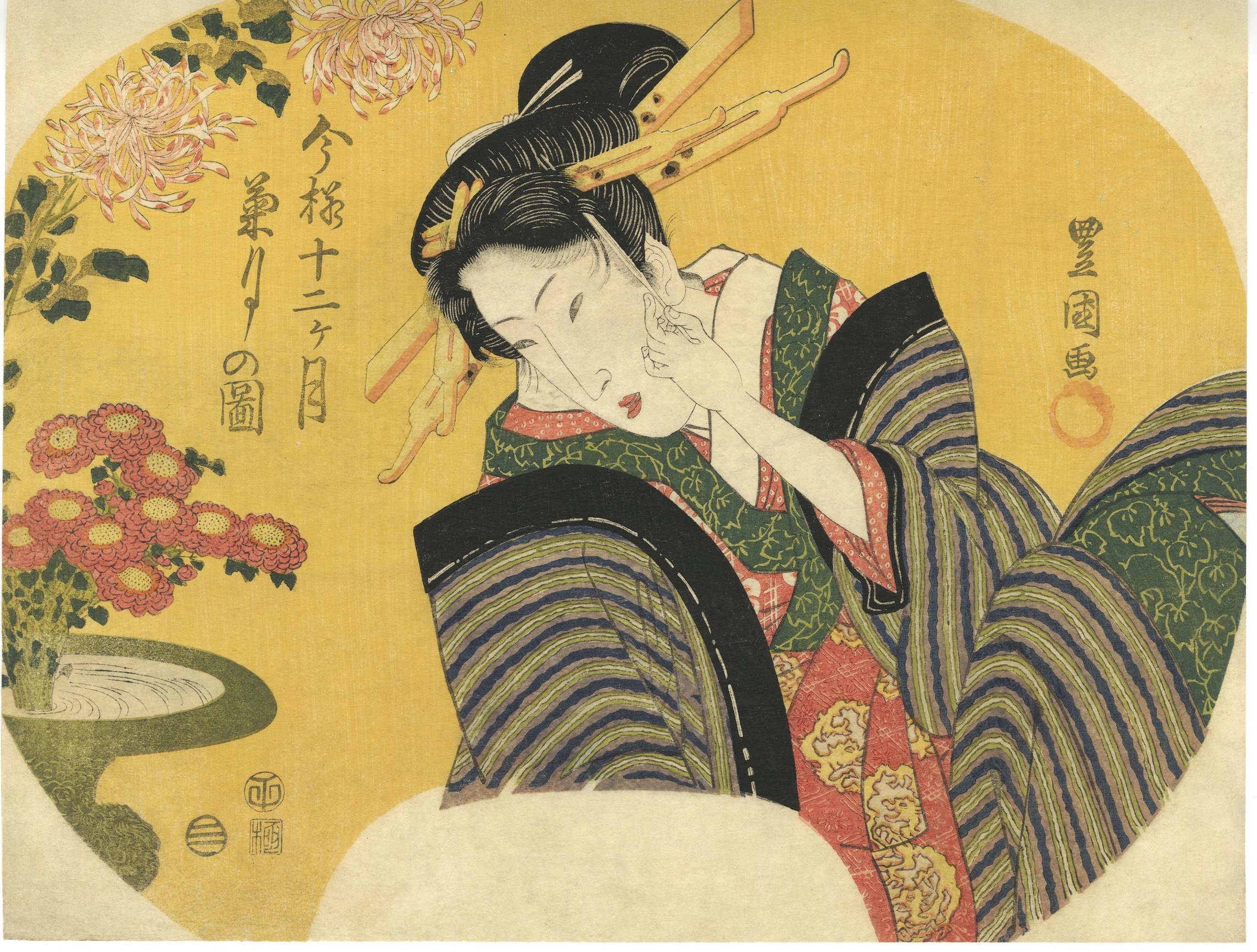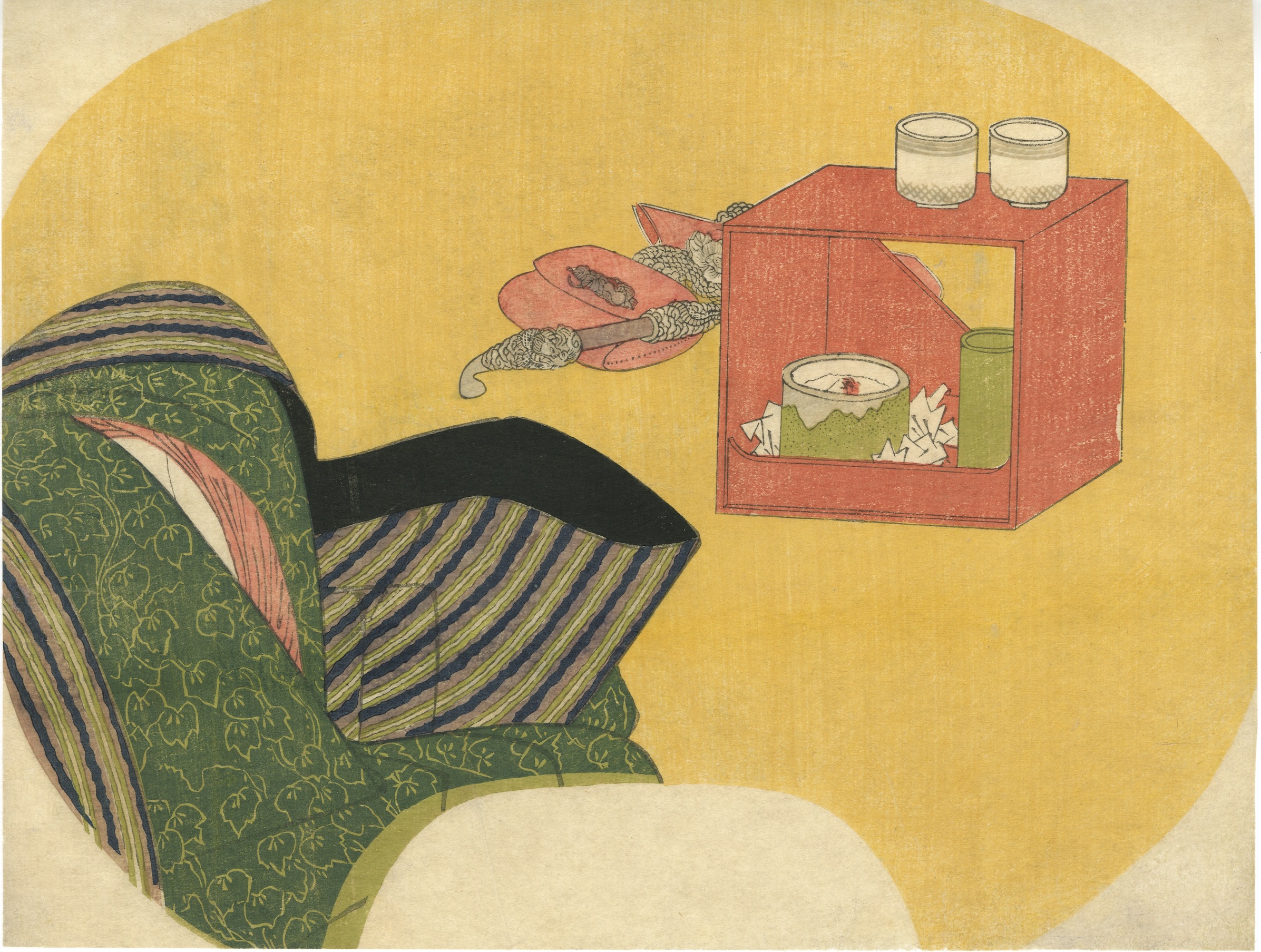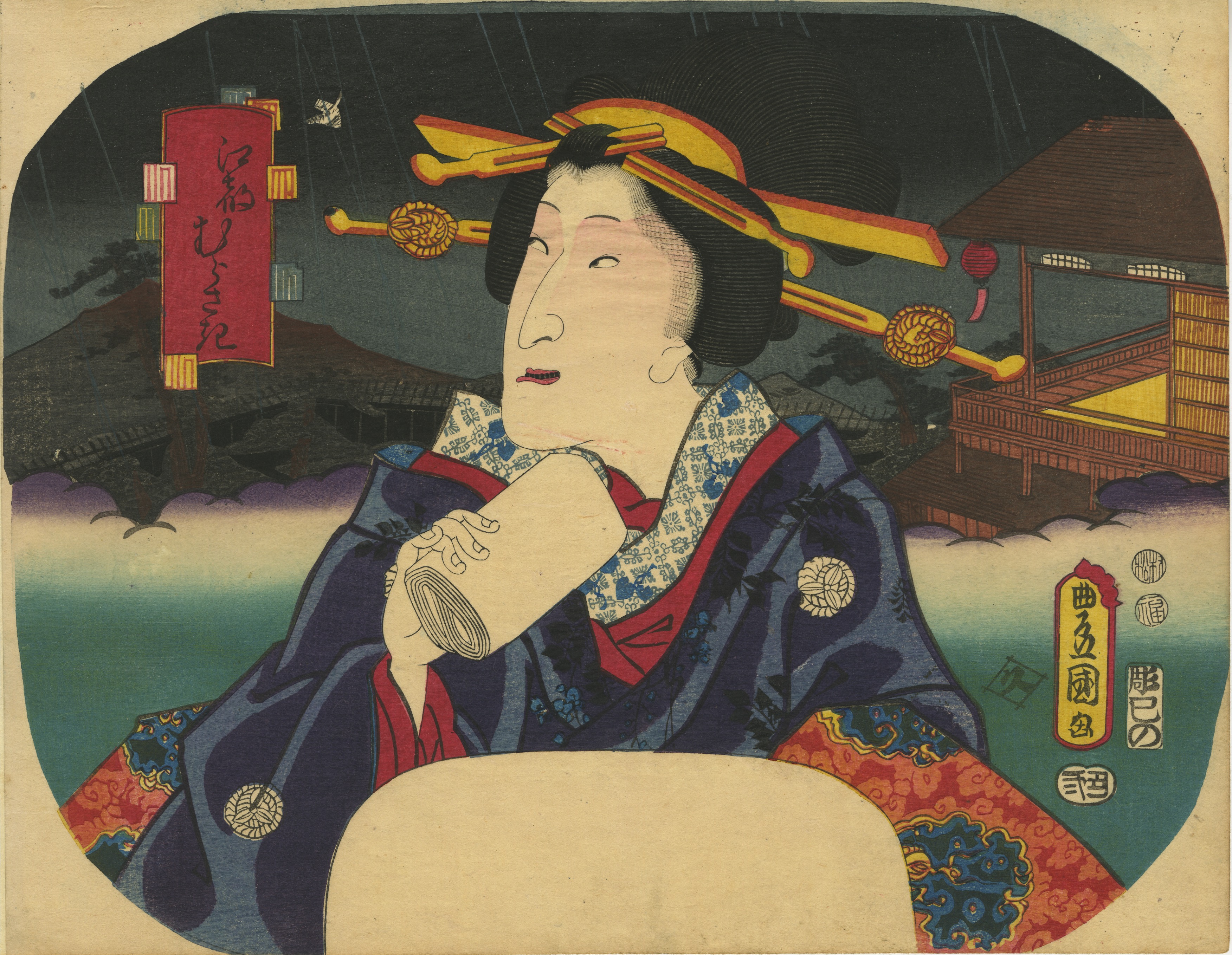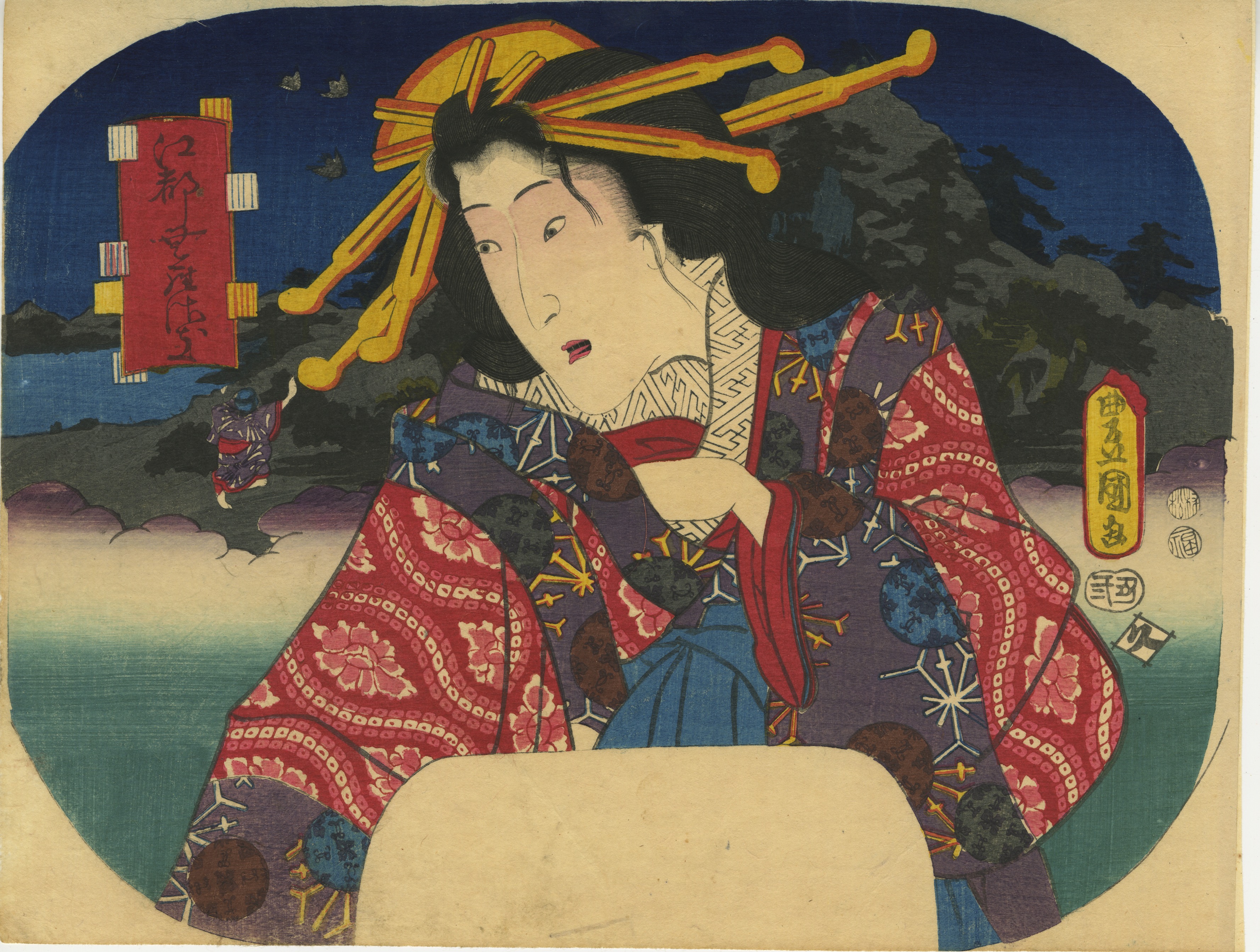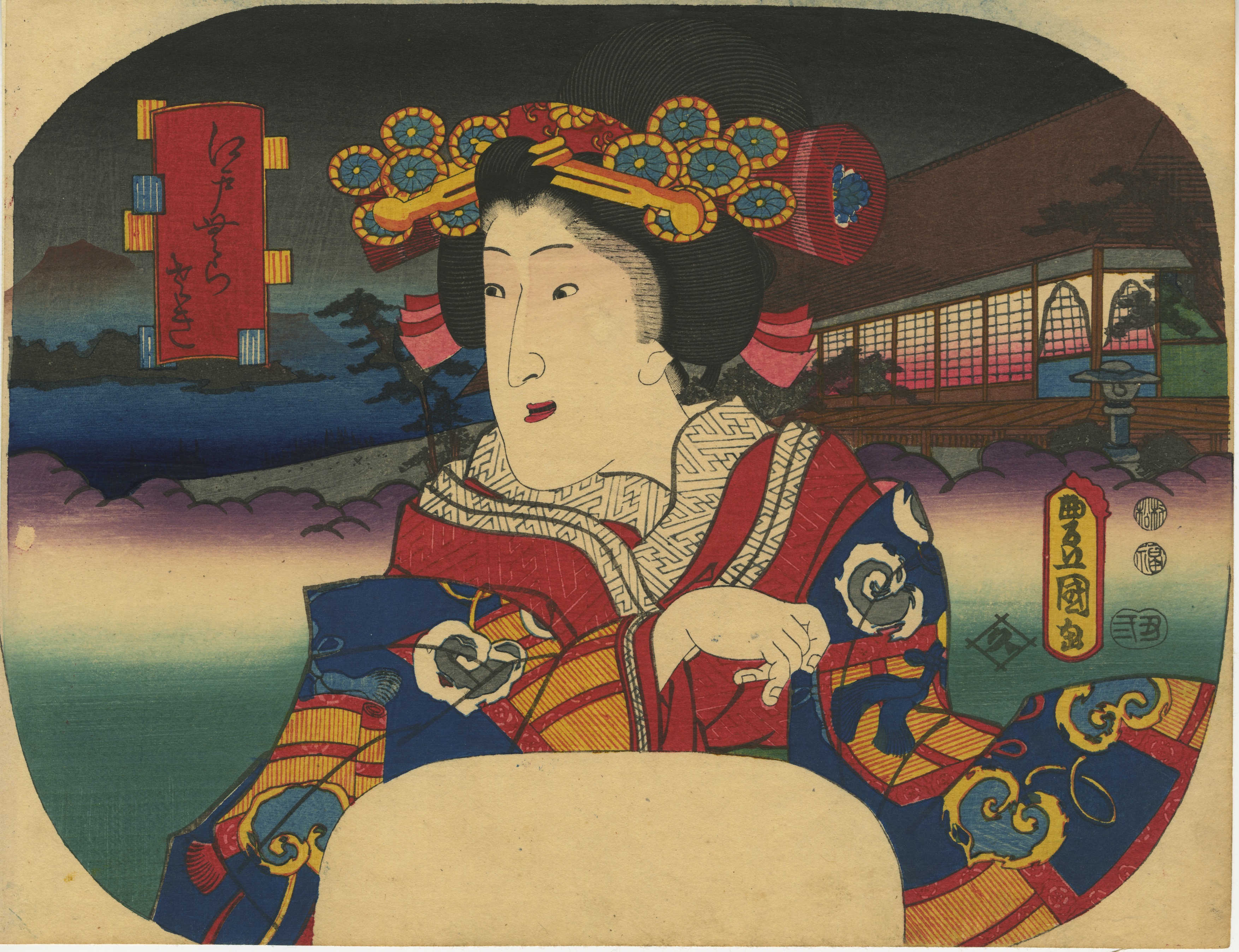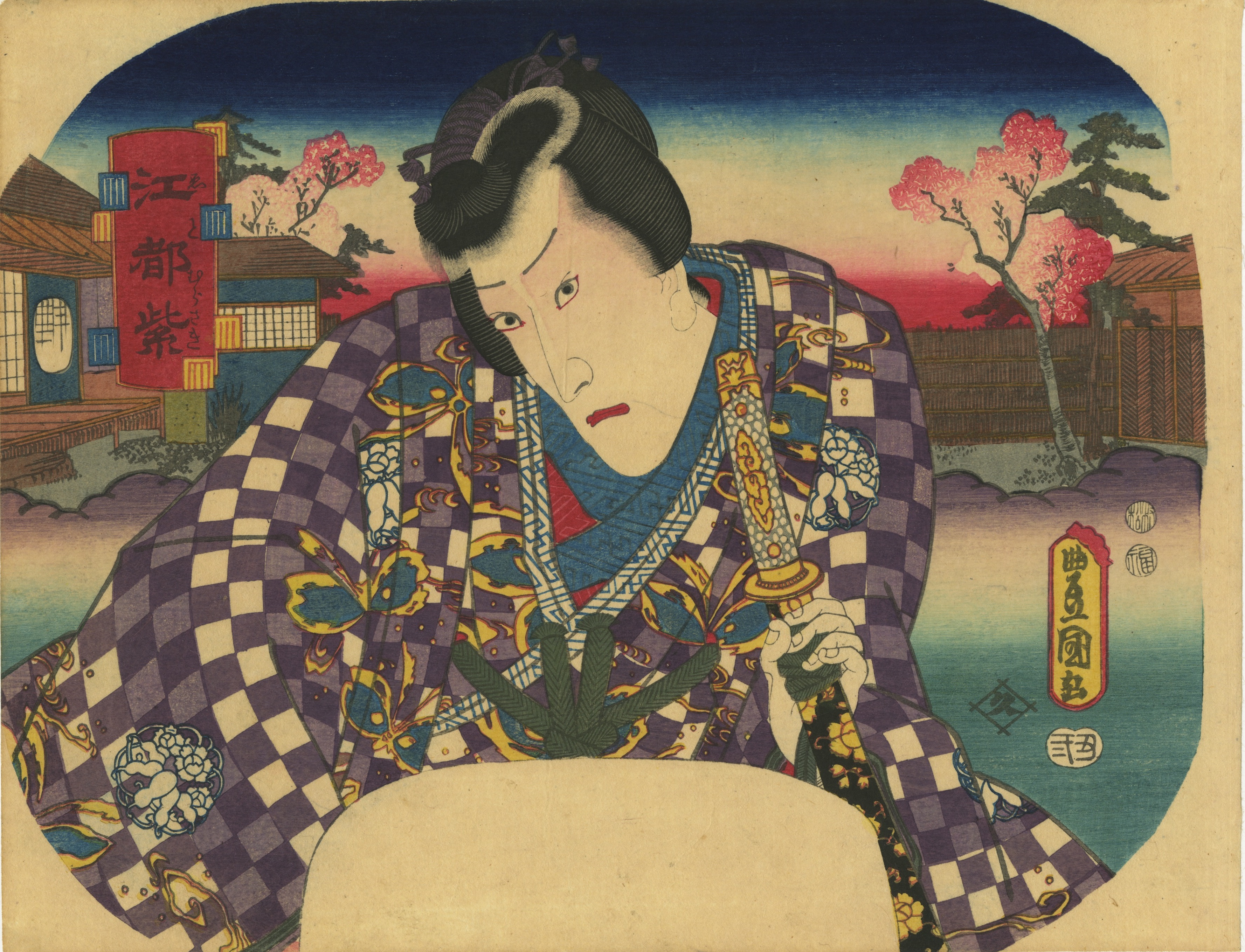-
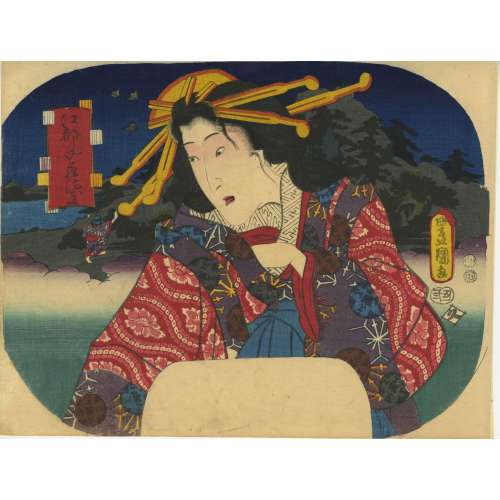 Utagawa Kunisada [歌川 国貞]; a.k.a. Utagawa Toyokuni III [三代歌川豊国] (Japanese, 1786 – 1865). Signed: Toyokuni ga [豊国 画] in a yellow toshidama cartouche. Publisher: Unknown, seal [久] Kyū (Japanese, fl. c. 1851 – 1861); (Marks 07-023 | U176a, possibly Sagamia Kyūzō). Date seal and double nanushi censor seals: Fuku & Muramatsu, Kaei 6, 2nd month (2/1853). Inscription in a red cartouche: (Purple of Edo // Purple of the Bay Capital) [江都むらさき] (Edo Murasaki), alluding to Murasaki Shikibu [紫 式部] (Japanese, c. 973/8 – c. 1014/31), the author of Genji Monogatari [源氏物語] (The Tale of Genji), a Heian period novel which was the source of a parody Nise Murasaki Inaka Genji [偐紫田舎源氏] (Fake Murasaki’s Rustic Genji) by Ryutei Tanehiko [柳亭種彦] (Japanese, 1783 – 1842). According to Horst Graebner: The actor is most probably Onoe Baikō IV [四代目尾上菊五郞] Onoe Kikugorō IV [四代目 尾上菊五郎] (Japanese, 1808 – 1860); other names: Onoe Baikō IV, Onoe Eizaburō III, Onoe Kikue, Nakamura Tatsuzō, Nakamura Kachō. One of the series of Kunisada's fan prints in this collection:
Utagawa Kunisada [歌川 国貞]; a.k.a. Utagawa Toyokuni III [三代歌川豊国] (Japanese, 1786 – 1865). Signed: Toyokuni ga [豊国 画] in a yellow toshidama cartouche. Publisher: Unknown, seal [久] Kyū (Japanese, fl. c. 1851 – 1861); (Marks 07-023 | U176a, possibly Sagamia Kyūzō). Date seal and double nanushi censor seals: Fuku & Muramatsu, Kaei 6, 2nd month (2/1853). Inscription in a red cartouche: (Purple of Edo // Purple of the Bay Capital) [江都むらさき] (Edo Murasaki), alluding to Murasaki Shikibu [紫 式部] (Japanese, c. 973/8 – c. 1014/31), the author of Genji Monogatari [源氏物語] (The Tale of Genji), a Heian period novel which was the source of a parody Nise Murasaki Inaka Genji [偐紫田舎源氏] (Fake Murasaki’s Rustic Genji) by Ryutei Tanehiko [柳亭種彦] (Japanese, 1783 – 1842). According to Horst Graebner: The actor is most probably Onoe Baikō IV [四代目尾上菊五郞] Onoe Kikugorō IV [四代目 尾上菊五郎] (Japanese, 1808 – 1860); other names: Onoe Baikō IV, Onoe Eizaburō III, Onoe Kikue, Nakamura Tatsuzō, Nakamura Kachō. One of the series of Kunisada's fan prints in this collection: -
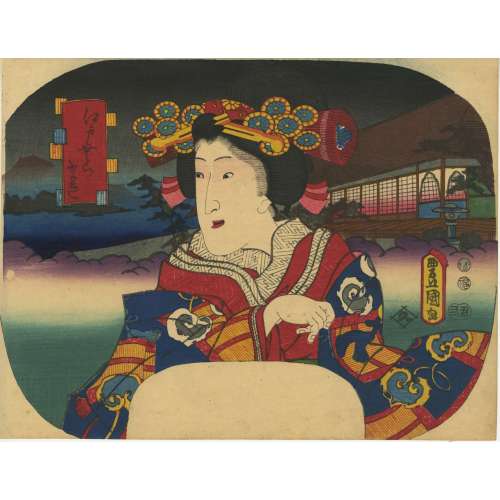 Utagawa Kunisada [歌川 国貞]; a.k.a. Utagawa Toyokuni III [三代歌川豊国] (Japanese, 1786 – 1865). Signed: Toyokuni ga [豊国 画] in a yellow toshidama cartouche. Publisher: Unknown, seal [久] Kyū (Japanese, fl. c. 1851 – 1861); (Marks 07-023 | U176a, possibly Sagamia Kyūzō). Date seal and double nanushi censor seals: Fuku & Muramatsu, Kaei 6, 2nd month (2/1853). Inscription in a red cartouche: Purple of Edo // Purple of the Bay Capital [江都むらさき] (Edo Murasaki), alluding to Murasaki Shikibu [紫 式部] (Japanese, c. 973/8 – c. 1014/31), the author of Genji Monogatari [源氏物語] (The Tale of Genji), a Heian period novel which was the source of a parody Nise Murasaki Inaka Genji [偐紫田舎源氏] (Fake Murasaki’s Rustic Genji) by Ryutei Tanehiko [柳亭種彦] (Japanese, 1783 – 1842). According to Horst Graebner: The actor is most probably Iwai Kumesaburō III. Iwai Hanshirō VIII [岩井半四郎] (Japanese, 1829 – 1882); other names: Iwai Shijaku II, Iwai Kumesaburō III [岩井粂三郎], Iwai Hisajirō II. One of the series of Kunisada's fan prints in this collection:
Utagawa Kunisada [歌川 国貞]; a.k.a. Utagawa Toyokuni III [三代歌川豊国] (Japanese, 1786 – 1865). Signed: Toyokuni ga [豊国 画] in a yellow toshidama cartouche. Publisher: Unknown, seal [久] Kyū (Japanese, fl. c. 1851 – 1861); (Marks 07-023 | U176a, possibly Sagamia Kyūzō). Date seal and double nanushi censor seals: Fuku & Muramatsu, Kaei 6, 2nd month (2/1853). Inscription in a red cartouche: Purple of Edo // Purple of the Bay Capital [江都むらさき] (Edo Murasaki), alluding to Murasaki Shikibu [紫 式部] (Japanese, c. 973/8 – c. 1014/31), the author of Genji Monogatari [源氏物語] (The Tale of Genji), a Heian period novel which was the source of a parody Nise Murasaki Inaka Genji [偐紫田舎源氏] (Fake Murasaki’s Rustic Genji) by Ryutei Tanehiko [柳亭種彦] (Japanese, 1783 – 1842). According to Horst Graebner: The actor is most probably Iwai Kumesaburō III. Iwai Hanshirō VIII [岩井半四郎] (Japanese, 1829 – 1882); other names: Iwai Shijaku II, Iwai Kumesaburō III [岩井粂三郎], Iwai Hisajirō II. One of the series of Kunisada's fan prints in this collection: -
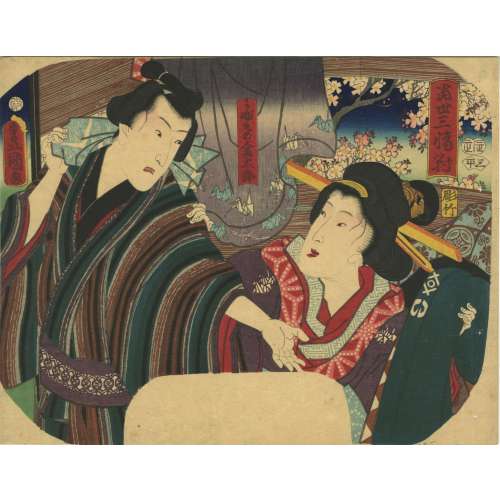 Utagawa Kunisada [歌川 国貞]; a.k.a. Utagawa Toyokuni III [三代歌川豊国] (Japanese, 1786 – 1865). Signed: Toyokuni ga [豊国 画] in a red toshidama cartouche. Publisher: Mikawaya Heiroku [三川屋平六] (Japanese, fl. c. 1848 – 1856); seal: Mihei [三平] (Marks 11-016 | 325a) Block carver: Yokokawa Takejirō [横川竹二郎] (Japanese, fl. 1845 – 1863), seal: 彫竹 – Hori Take. Date seal and aratame censor seal: [辰正] Ansei 3, 1st month (1856). Inscriptions: Right cartouche: Three good fortunes of the present day [当世三福対] (Tosei sambuku tsui) Center cartouche: Ubuge no Kintaro [産毛の金太郎] (うぶげのきんたろう) According to Horst Graebner, the play is Tomigaoka koi no Yamabiraki (or Tomioka Koi no Yamabiraki [富岡戀山開], according to kabuki21.com, common title Ninin Shinbē [二人新兵衛]); Kintarō might be Nakamura Fukusuke I [中村福助], the female role might be Mikuni Kojorō [三国小女郎] (or Mikuni no Kojorō). Nakamura Shikan IV [中村芝翫] (Japanese, 1831 – 1899); other names: Nakamura Fukusuke I, Nakamura Masanosuke I, Nakamura Komasaburō, Nakamura Tamatarō I.
Utagawa Kunisada [歌川 国貞]; a.k.a. Utagawa Toyokuni III [三代歌川豊国] (Japanese, 1786 – 1865). Signed: Toyokuni ga [豊国 画] in a red toshidama cartouche. Publisher: Mikawaya Heiroku [三川屋平六] (Japanese, fl. c. 1848 – 1856); seal: Mihei [三平] (Marks 11-016 | 325a) Block carver: Yokokawa Takejirō [横川竹二郎] (Japanese, fl. 1845 – 1863), seal: 彫竹 – Hori Take. Date seal and aratame censor seal: [辰正] Ansei 3, 1st month (1856). Inscriptions: Right cartouche: Three good fortunes of the present day [当世三福対] (Tosei sambuku tsui) Center cartouche: Ubuge no Kintaro [産毛の金太郎] (うぶげのきんたろう) According to Horst Graebner, the play is Tomigaoka koi no Yamabiraki (or Tomioka Koi no Yamabiraki [富岡戀山開], according to kabuki21.com, common title Ninin Shinbē [二人新兵衛]); Kintarō might be Nakamura Fukusuke I [中村福助], the female role might be Mikuni Kojorō [三国小女郎] (or Mikuni no Kojorō). Nakamura Shikan IV [中村芝翫] (Japanese, 1831 – 1899); other names: Nakamura Fukusuke I, Nakamura Masanosuke I, Nakamura Komasaburō, Nakamura Tamatarō I. -
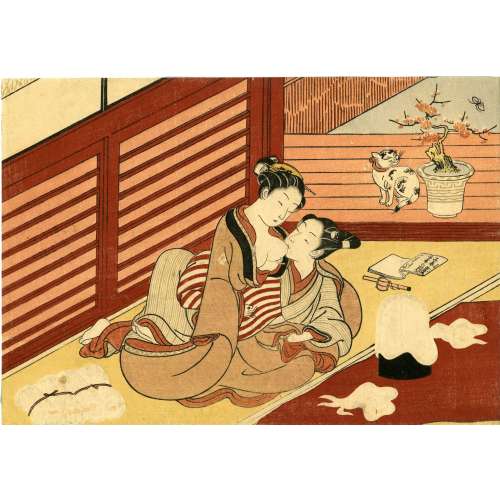 Artist (attributed, no signature): Suzuki Harunobu [鈴木 春信] (Japanese, c. 1725 – 1770). The title is taken from [LIB-1478.2013] Gian Carlo Calza, Stefania Piotti. Poem of the pillow and other stories. — Phaidon Press, 2010; pp. 148-9. Alternative title: Man sucking woman's breast and a cat sitting under a bonsai tree. The open book beside the couple reads 子春 (Koharu). Woodblock print from the series Mirror Picture of Japan (Wakoku kagami); Size: Horizontal chuban; 21 x 26 cm.
Artist (attributed, no signature): Suzuki Harunobu [鈴木 春信] (Japanese, c. 1725 – 1770). The title is taken from [LIB-1478.2013] Gian Carlo Calza, Stefania Piotti. Poem of the pillow and other stories. — Phaidon Press, 2010; pp. 148-9. Alternative title: Man sucking woman's breast and a cat sitting under a bonsai tree. The open book beside the couple reads 子春 (Koharu). Woodblock print from the series Mirror Picture of Japan (Wakoku kagami); Size: Horizontal chuban; 21 x 26 cm. -
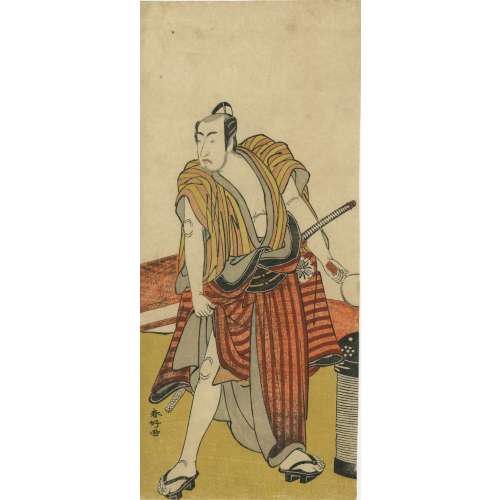 Artist: Katsukawa Shunkō [勝川 春好] (Japanese, 1743 – 1812).
Artist: Katsukawa Shunkō [勝川 春好] (Japanese, 1743 – 1812).Actor: Matsumoto Kōshirō IV [[松本幸四郎]; other names: Omegawa Kyōjūrō, Ichikawa Komazō II, Ichikawa Somegorô I, Ichikawa Takejūrō, Segawa Kinji, Segawa Kingo] (Japanese, 1737 – 1802).
Signed: Shunkō ga. Size: Hosoban; 14 x 33 cm. SOLD -
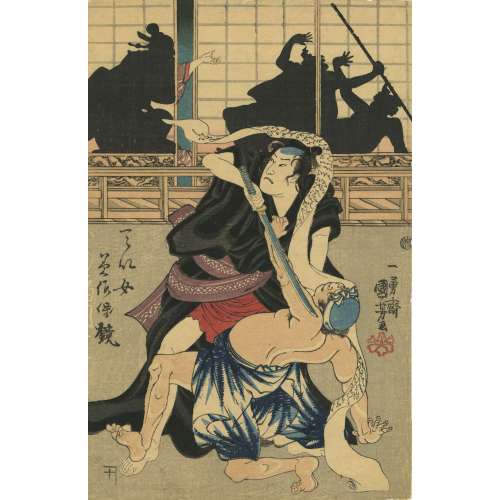 Okon's Lover Fukuoka Mitsugi, from the series Mirror of Virtuous Women (Teijo misao kagami)「てい女 美作保鏡 おこん 福岡貢」. Artist: Utagawa Kuniyoshi [歌川 國芳] (Japanese, 1798 – 1861). Publisher: Kojimaya Jūbei [小嶋屋重兵衛] (Japanese, fl. c. 1797 – 1869). Year: 1843–47 (Tenpô 14–Kôka 4). Signed: 一勇斎国芳画 – Ichiyûsai Kuniyoshi ga. Censor's seal: Watari. Size: Vertical ôban; 36.8 x 25.6 cm Ref.: MFA № 11.16085.
Okon's Lover Fukuoka Mitsugi, from the series Mirror of Virtuous Women (Teijo misao kagami)「てい女 美作保鏡 おこん 福岡貢」. Artist: Utagawa Kuniyoshi [歌川 國芳] (Japanese, 1798 – 1861). Publisher: Kojimaya Jūbei [小嶋屋重兵衛] (Japanese, fl. c. 1797 – 1869). Year: 1843–47 (Tenpô 14–Kôka 4). Signed: 一勇斎国芳画 – Ichiyûsai Kuniyoshi ga. Censor's seal: Watari. Size: Vertical ôban; 36.8 x 25.6 cm Ref.: MFA № 11.16085. -
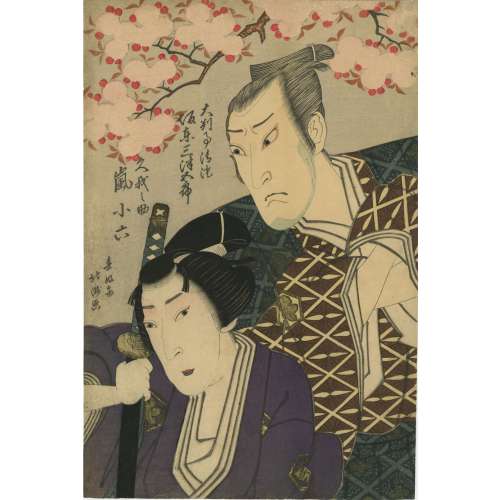 Bandō Mitsugorō III as Daihanji Kiyozumi and Arashi Koroku IV as Koganosuke in kabuki play Imoseyama, an example of womanly virtue (Imoseyama onna teikin). 大判事清澄 坂東三津五郎」(三代)・「久我之助 嵐小六」(四代) Artist: Shunkōsai Hokushū [春好斎北洲] (Japanese, fl. 1802 – 1832) Year: 1821 (3rd month). MFA description: “The Kabuki play Mount Imo and Mount Se: An Exemplary Tale of Womanly Virtue (Imoseyama onna teikin), originally based on a puppet play, is set in ancient Japan when the Soga clan served as regents to the emperor. Two children, Hinadori and Koganosuke, of rival court families, are held hostage under orders from the tyrant Soga no Iruka to ensure their families do not revolt. The children fall in love, but rather than create conflicts for their families they each vow to die by suicide. When the parents learn of their plans, they resolve to cooperate to overthrow Iruka. Here Koganosuke and his father Kiyozumi are shown; a companion sheet on the left would have shown Hinadori and her mother Sadaka.” The play Imoseyama, an example of womanly virtue (Imoseyama onna teikin), was staged at Osaka's Kado Shibai (Kadoza, Kado Gekijô, Kado no Shibai) from 3/1821. According to Herwig, it is the right sheet of a diptych (see below). MFA Accession number: 2011.128 Kabuki actors: Bandō Mitsugorō III [三代目 坂東 三津五郎] (Japanese, 1775 – 1831); other names: Bandō Minosuke I, Morita Kanjirô II, Bandō Mitahachi I, Bandō Minosuke I, Bandō Mitahachi I. Arashi Koroku IV [四代目嵐小六] (Japanese, 1783 – 1826)
Bandō Mitsugorō III as Daihanji Kiyozumi and Arashi Koroku IV as Koganosuke in kabuki play Imoseyama, an example of womanly virtue (Imoseyama onna teikin). 大判事清澄 坂東三津五郎」(三代)・「久我之助 嵐小六」(四代) Artist: Shunkōsai Hokushū [春好斎北洲] (Japanese, fl. 1802 – 1832) Year: 1821 (3rd month). MFA description: “The Kabuki play Mount Imo and Mount Se: An Exemplary Tale of Womanly Virtue (Imoseyama onna teikin), originally based on a puppet play, is set in ancient Japan when the Soga clan served as regents to the emperor. Two children, Hinadori and Koganosuke, of rival court families, are held hostage under orders from the tyrant Soga no Iruka to ensure their families do not revolt. The children fall in love, but rather than create conflicts for their families they each vow to die by suicide. When the parents learn of their plans, they resolve to cooperate to overthrow Iruka. Here Koganosuke and his father Kiyozumi are shown; a companion sheet on the left would have shown Hinadori and her mother Sadaka.” The play Imoseyama, an example of womanly virtue (Imoseyama onna teikin), was staged at Osaka's Kado Shibai (Kadoza, Kado Gekijô, Kado no Shibai) from 3/1821. According to Herwig, it is the right sheet of a diptych (see below). MFA Accession number: 2011.128 Kabuki actors: Bandō Mitsugorō III [三代目 坂東 三津五郎] (Japanese, 1775 – 1831); other names: Bandō Minosuke I, Morita Kanjirô II, Bandō Mitahachi I, Bandō Minosuke I, Bandō Mitahachi I. Arashi Koroku IV [四代目嵐小六] (Japanese, 1783 – 1826)
Ref.: [LIB-1197.2016] Arendie and Henk Herwig. Heroes of the kabuki stage: an introduction to kabuki with retellings of famous plays, illustrated by woodblock prints. — Amsterdam: Hotei Publishing, 2004; p. 72: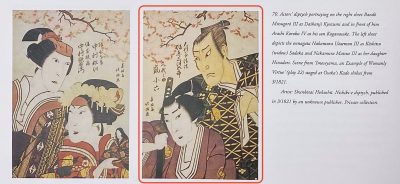
Ref: [LIB-2973.2022] Ukiyo-e: A journey through the Floating World / Exhibition catalogue (Japan, Jan-Jul 2014). — The Yomiuri Shimbun, 2014; № 358, p. 226. "Bandō Mitsugorō III as Grand arbiter Kiyosumi and Arashi Koroku IV as Koganosuke":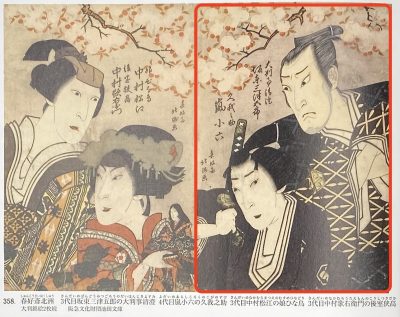
-
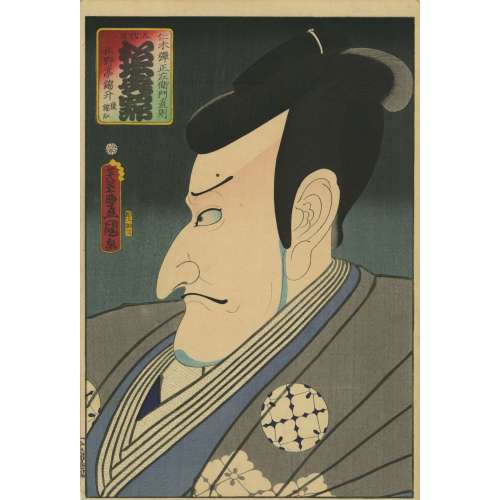 Kabuki actor: Matsumoto Kōshirō V [五代目松本幸四郎] (Japanese, 1764-1838); other names: Ichikawa Komazō III, Ichikawa Sumizō I. Role: Nikki Danjo (仁木弾正): "Evil retainer Nikki Danjo who plots to overthrow his lord in the play Precious incense and the bush clover of Sendai (Meiboku sendai hagi)" [R. Kruml]. Artist: Utagawa Kunisada [歌川 国貞] a.k.a. Utagawa Toyokuni III [三代歌川豊国] (Japanese, 1786 – 1865). Block cutter: Horikō (Kiyomizu) Ryūzō [彫工 柳三]. Publisher: Ebisuya Shoshichi [恵比寿屋庄七], Kinshōdō (Japanese, fl. c. 1846 – 1883). Year: 1863 (Bunkyū 3), 7th month. Size: Vertical ōban, hōsho paper. Signed: Nanajuhassai (aged seventy-eight) Toyokuni ga within toshidama cartouche. Censor’s seal: date-aratame. This print is from a series of portraits that Kunisada undertook very late in life and has been named Kinshodo-ban yakusha okubi-e (Kinshodo’s Large-Head Actor Portraits) in reference to the publisher, Ebisuya Shochochi of Kinshodo. The series depicted great actors in their famous roles from the past and present. Ref.: (1) [LIB-1212.2017] Robert Schaap. Kunisada: Imaging, drama and beauty. — Leiden: Hotei Publishing, 2016, p. 118 and 167 (№ 42):
Kabuki actor: Matsumoto Kōshirō V [五代目松本幸四郎] (Japanese, 1764-1838); other names: Ichikawa Komazō III, Ichikawa Sumizō I. Role: Nikki Danjo (仁木弾正): "Evil retainer Nikki Danjo who plots to overthrow his lord in the play Precious incense and the bush clover of Sendai (Meiboku sendai hagi)" [R. Kruml]. Artist: Utagawa Kunisada [歌川 国貞] a.k.a. Utagawa Toyokuni III [三代歌川豊国] (Japanese, 1786 – 1865). Block cutter: Horikō (Kiyomizu) Ryūzō [彫工 柳三]. Publisher: Ebisuya Shoshichi [恵比寿屋庄七], Kinshōdō (Japanese, fl. c. 1846 – 1883). Year: 1863 (Bunkyū 3), 7th month. Size: Vertical ōban, hōsho paper. Signed: Nanajuhassai (aged seventy-eight) Toyokuni ga within toshidama cartouche. Censor’s seal: date-aratame. This print is from a series of portraits that Kunisada undertook very late in life and has been named Kinshodo-ban yakusha okubi-e (Kinshodo’s Large-Head Actor Portraits) in reference to the publisher, Ebisuya Shochochi of Kinshodo. The series depicted great actors in their famous roles from the past and present. Ref.: (1) [LIB-1212.2017] Robert Schaap. Kunisada: Imaging, drama and beauty. — Leiden: Hotei Publishing, 2016, p. 118 and 167 (№ 42):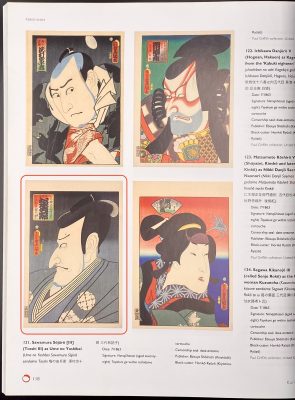 Ref.: (1) [LIB-1197.2016] Arendie and Henk Herwig. Heroes of the kabuki stage: an introduction to kabuki with retellings of famous plays, illustrated by woodblock prints. — Amsterdam: Hotei Publishing, 2004; pp. 243-249.
Ref.: (1) [LIB-1197.2016] Arendie and Henk Herwig. Heroes of the kabuki stage: an introduction to kabuki with retellings of famous plays, illustrated by woodblock prints. — Amsterdam: Hotei Publishing, 2004; pp. 243-249.
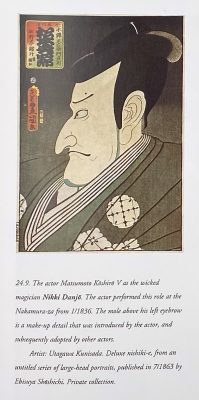
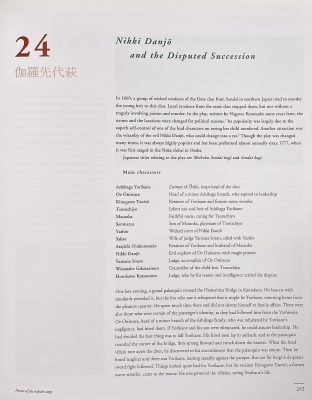
-
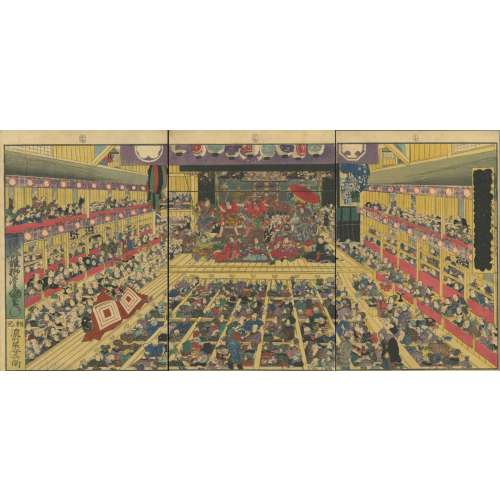 Superb Edo pictures illustrating dances (Odori keiyô Edo-e no sakae): Interior of an imaginary theatre with a performance of Shibaraku 「踊形容江戸絵栄」. Artist: Utagawa Kunisada [歌川 国貞] a.k.a. Utagawa Toyokuni III [三代歌川豊国] (Japanese, 1786 – 1865). Publisher: Nōshūya Yasubei (Japanese, fl. c. 1851 – 1870). Year: 1858 (Ansei 5), 7th month. Size: Vertical ôban triptych; 36.9 x 75.7 cm. Signed: 一陽斎雛獅豊国筆(年玉印) – Ichiyôsai Hinashi Toyokuni ga (on the left sheet only). Censor's seal: Horse 7 [午七 彫師]. Subject: Shibaraku. Ref.: MFA impression: 11.44263a-c; Robert Schaap. Kunisada (2016), p. 101 [LIB-1212.2017]. Ref.: [LIB-1197.2016] Arendie and Henk Herwig. Heroes of the Kabuki stage: an introduction to Kabuki with retellings of famous plays, illustrated by woodblock prints. — Amsterdam: Hotei Publishing, 2004; p. 38. [LIB-3316.2024] Chris Uhlenbeck, Jim Dwinger, Josephine Smit. The Riddles of Ukiyo-e: Women and Men in Japanese Prints. — Brussels: Ludion, 2023, p. 218-9, № 107.
Superb Edo pictures illustrating dances (Odori keiyô Edo-e no sakae): Interior of an imaginary theatre with a performance of Shibaraku 「踊形容江戸絵栄」. Artist: Utagawa Kunisada [歌川 国貞] a.k.a. Utagawa Toyokuni III [三代歌川豊国] (Japanese, 1786 – 1865). Publisher: Nōshūya Yasubei (Japanese, fl. c. 1851 – 1870). Year: 1858 (Ansei 5), 7th month. Size: Vertical ôban triptych; 36.9 x 75.7 cm. Signed: 一陽斎雛獅豊国筆(年玉印) – Ichiyôsai Hinashi Toyokuni ga (on the left sheet only). Censor's seal: Horse 7 [午七 彫師]. Subject: Shibaraku. Ref.: MFA impression: 11.44263a-c; Robert Schaap. Kunisada (2016), p. 101 [LIB-1212.2017]. Ref.: [LIB-1197.2016] Arendie and Henk Herwig. Heroes of the Kabuki stage: an introduction to Kabuki with retellings of famous plays, illustrated by woodblock prints. — Amsterdam: Hotei Publishing, 2004; p. 38. [LIB-3316.2024] Chris Uhlenbeck, Jim Dwinger, Josephine Smit. The Riddles of Ukiyo-e: Women and Men in Japanese Prints. — Brussels: Ludion, 2023, p. 218-9, № 107. -
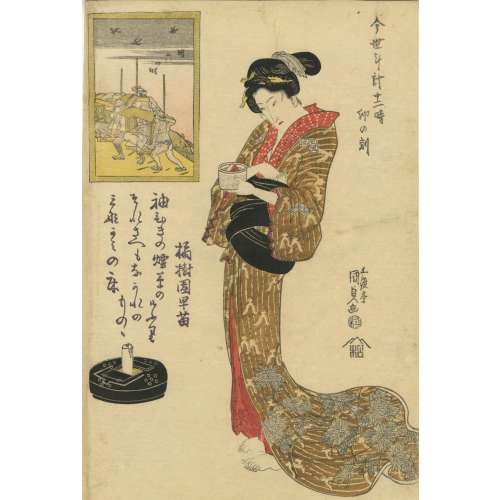 Artist: Utagawa Kunisada [歌川 国貞] a.k.a. Utagawa Toyokuni III [三代歌川豊国] (Japanese, 1786 – 1865). Publisher: Matsumura Tatsuemon [松村辰右衛門] (Japanese, fl. c. 1793 – 1832). Year: c. 1820–22 (Bunsei era). Signed: 五渡亭国貞画 – Gototei Kunisada ga. Censor's seal: kiwame 改印:極
Artist: Utagawa Kunisada [歌川 国貞] a.k.a. Utagawa Toyokuni III [三代歌川豊国] (Japanese, 1786 – 1865). Publisher: Matsumura Tatsuemon [松村辰右衛門] (Japanese, fl. c. 1793 – 1832). Year: c. 1820–22 (Bunsei era). Signed: 五渡亭国貞画 – Gototei Kunisada ga. Censor's seal: kiwame 改印:極
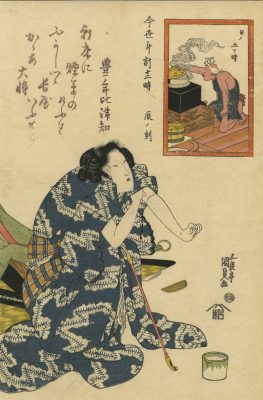
SVJP-0179-6.2014
The Hour of the Dragon, Fifth Hour of Day (Tatsu no koku, Hi no itsutsu toki), from the series Twelve Hours of a Modern Clock (Imayo tokei jūniji) 「今世時計十二時 辰ノ刻 日ノ五つ時」 MFA impression: 11.15315. 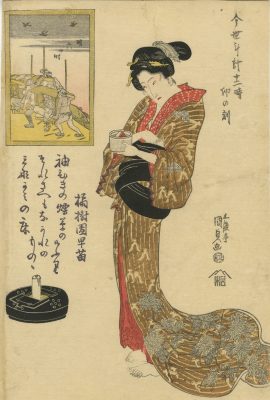
SVJP-0179-1.2014
The Hour of the Rabbit, Sixth Hour of Day (U no koku, Ake muttsu toki), from the series Twelve Hours of a Modern Clock (Imayo tokei jūniji) 「今世時計十二時 卯ノ刻 明六つ時」. MFA impression: 11.15317 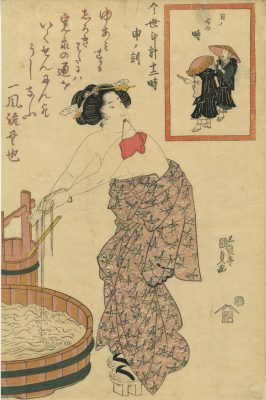
SVJP-0179-2.2014
The Hour of the Monkey, Seventh Hour of Day (Saru no koku, Hi no nanatsu toki), from the series Twelve Hours of a Modern Clock (Imayo tokei jūniji) 「今様時計十二時 申ノ刻 日ノ七つ時」 MFA impression: 11.39692 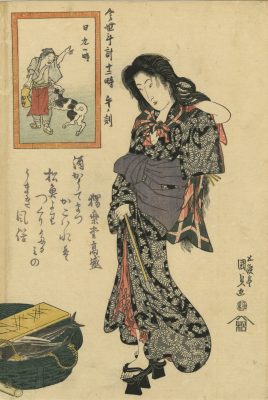
SVJP-0179-8.2014
The Hour of the Horse, Ninth Hour of Day (Uma no koku, Hi kokonotsu toki), from the series Twelve Hours of a Modern Clock (Imayo tokei jūniji) 「今世時計十二時 午ノ刻 日九つ時」. MFA impression: 11.15314 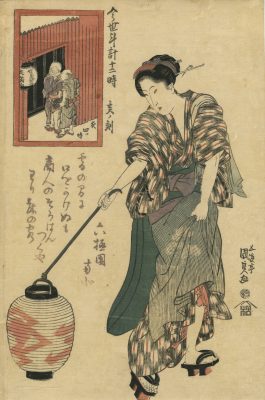
SVJP-0179-4.2014
The Hour of the Boar, Fourth Hour of Night (I no koku, Yoru yottsu toki), from the series Twelve Hours of a Modern Clock (Imayo tokei jūniji) 「今世時計十二時 亥ノ刻 夜四つ時」. MFA impression: 11.15552 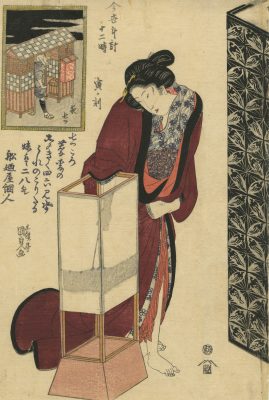
SVJP-0179-3.2014
The Hour of the Tiger, Seventh Hour of Night (Tora no koku, Yoru nanatsu), from the series Twelve Hours of a Modern Clock (Imayo tokei jūniji) 「今世時計十二時 寅ノ刻 夜七つ」. MFA impression: 11.15313 Ref.: Izzard. Kunisada’s world [LIB-2970.2022]. 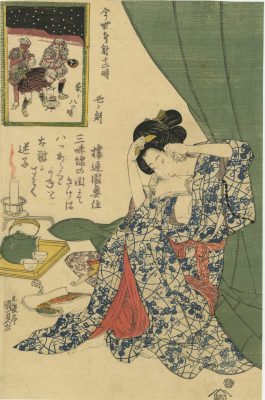
SVJP-0179-5.2014
The Hour of the Ox, Eight Hour of Night (Ushi no koku, Yoru no yattsu toki), from the series Twelve Hours of a Modern Clock (Imayo tokei jūniji) 「今世時計十二時 丑ノ刻 夜ノ八つ時」. MFA impression: 11.26906 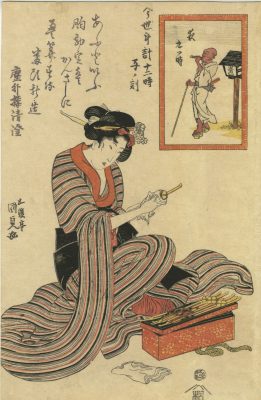
SVJP-0179-7.2014
The Hour of the Rat, Ninth Hour of Night (Ne no koku, Yoru kokonotsu toki), from the series Twelve Hours of a Modern Clock (Imayo tokei jūniji) 「今世時計十二時 子ノ刻 夜九つ時」. MFA impression: 11.15312 -
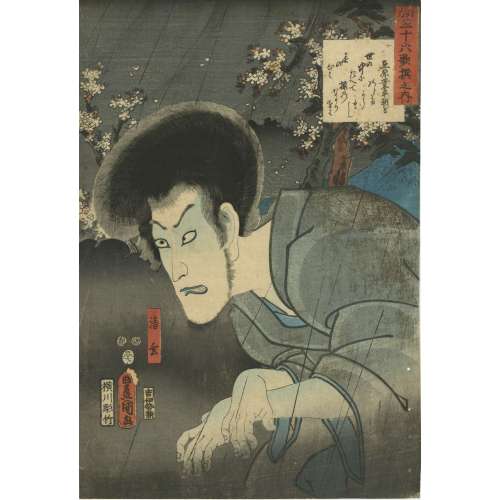 Poem by Ariwara no Narihira Ason: (Actor Ichikawa Danjûrô VIII as) Seigen, from the series Comparisons for Thirty-six Selected Poems (Mitate sanjûrokkasen no uchi)「見立三十六歌撰之内 有原業平朝臣 清玄」 八代目市川団十郎. Poem: Yo no naka ni/ taete sakura no/ nakariseba/ haru no kokoro wa/ nodokekaramashi. Kabuki actor: Ichikawa Danjūrō VIII [八代目 市川 團十郎] (Japanese, 1823 – 1854); other names: Ichikawa Ebizô VI, Ichikawa Shinnosuke II. Artist: Utagawa Kunisada [歌川 国貞] a.k.a. Utagawa Toyokuni III [三代歌川豊国] (Japanese, 1786 – 1865). Block cutter: Yokokawa Horitake [横川彫武] a.k.a. Yokokawa Takejiro [横川竹二郎] (Japanese, fl. 1860s). Publisher: Iseya Kanekichi [伊勢屋兼吉] (Japanese, fl. 1840s – c. 1875) Year: 1852 (Kaei 5), 10th month. Size: Vertical ōban; 36.5 × 25.4 cm. Signed: Toyokuni ga, in toshidama cartouche [豊国画(年玉枠] Censors' seals: Fuku, (Muramatsu), Rat 10. Ref: MFA Accession № 11.36779.43.
Poem by Ariwara no Narihira Ason: (Actor Ichikawa Danjûrô VIII as) Seigen, from the series Comparisons for Thirty-six Selected Poems (Mitate sanjûrokkasen no uchi)「見立三十六歌撰之内 有原業平朝臣 清玄」 八代目市川団十郎. Poem: Yo no naka ni/ taete sakura no/ nakariseba/ haru no kokoro wa/ nodokekaramashi. Kabuki actor: Ichikawa Danjūrō VIII [八代目 市川 團十郎] (Japanese, 1823 – 1854); other names: Ichikawa Ebizô VI, Ichikawa Shinnosuke II. Artist: Utagawa Kunisada [歌川 国貞] a.k.a. Utagawa Toyokuni III [三代歌川豊国] (Japanese, 1786 – 1865). Block cutter: Yokokawa Horitake [横川彫武] a.k.a. Yokokawa Takejiro [横川竹二郎] (Japanese, fl. 1860s). Publisher: Iseya Kanekichi [伊勢屋兼吉] (Japanese, fl. 1840s – c. 1875) Year: 1852 (Kaei 5), 10th month. Size: Vertical ōban; 36.5 × 25.4 cm. Signed: Toyokuni ga, in toshidama cartouche [豊国画(年玉枠] Censors' seals: Fuku, (Muramatsu), Rat 10. Ref: MFA Accession № 11.36779.43. -
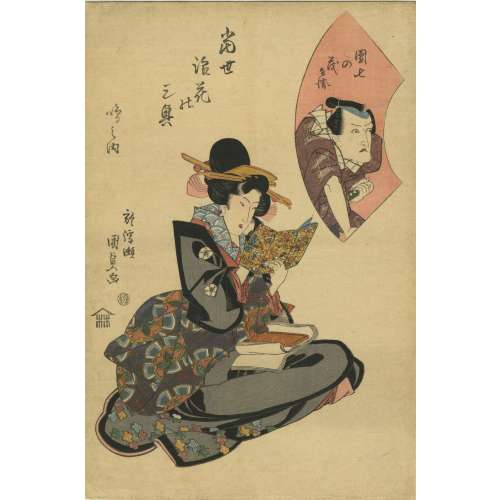 The left sheet of (optional) triptych: Geisha of the Shimanouchi district: Actor Nakamura Utaemon III as Danshichi no Mohei, from Three Pleasures of Present-day Osaka (Tōsei Naniwa no sankō)「当世浪花の三興 島之内」 「団七の茂兵衛」 三代目中村歌右衛門. Publisher: Iseya Rihei [伊勢屋利兵衛] (Japanese, fl. 1790s – c. 1879) Year: 1821 (Bunsei 4). Size: Vertical ōban; 36.5 x 25.1 cm. Signed: 於浮瀬亭国貞画 – Drawn by Kunisada in Ukabuse (Ukabuse ni oite Kunisada ga). Ukabuse is the name of a famous restaurant in Osaka, this signature can be found only on a three print bijin series [Kunisada Project]. Censor's seal: kiwame 改印:極 Actor Nakamura Utaemon III [中村歌右衛門] (Japanese, 1778 – 1838); other names: Nakamura Tamasuke, Nakamura Baigyoku I, Nakamura Shikan I, Kagaya Fukunosuke I. Character: Danshichi no Mohei [団七茂兵衛]. Ref: MFA ACCESSION NUMBER 11.21936; LIB-2967.2022 Izzard. Full series (triptych) Three Pleasures of Present-day Osaka (Tōsei Naniwa no sankō):
The left sheet of (optional) triptych: Geisha of the Shimanouchi district: Actor Nakamura Utaemon III as Danshichi no Mohei, from Three Pleasures of Present-day Osaka (Tōsei Naniwa no sankō)「当世浪花の三興 島之内」 「団七の茂兵衛」 三代目中村歌右衛門. Publisher: Iseya Rihei [伊勢屋利兵衛] (Japanese, fl. 1790s – c. 1879) Year: 1821 (Bunsei 4). Size: Vertical ōban; 36.5 x 25.1 cm. Signed: 於浮瀬亭国貞画 – Drawn by Kunisada in Ukabuse (Ukabuse ni oite Kunisada ga). Ukabuse is the name of a famous restaurant in Osaka, this signature can be found only on a three print bijin series [Kunisada Project]. Censor's seal: kiwame 改印:極 Actor Nakamura Utaemon III [中村歌右衛門] (Japanese, 1778 – 1838); other names: Nakamura Tamasuke, Nakamura Baigyoku I, Nakamura Shikan I, Kagaya Fukunosuke I. Character: Danshichi no Mohei [団七茂兵衛]. Ref: MFA ACCESSION NUMBER 11.21936; LIB-2967.2022 Izzard. Full series (triptych) Three Pleasures of Present-day Osaka (Tōsei Naniwa no sankō):


-
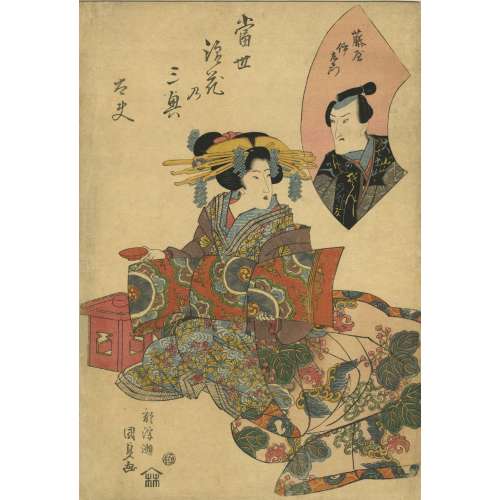 The central sheet of (optional) triptych: Courtesan (Tayū): kabuki actor Bandō Mitsugorō III as Fujiya Izaemon from Three pleasures of present-day Osaka (Tōsei Naniwa no sankō)「当世浪花の三興 太夫」 「藤屋伊左衛門」 三代目坂東三津五郎. Publisher: Iseya Rihei [伊勢屋利兵衛] (Japanese, fl. 1790s – c. 1879) Year: 1821 (Bunsei 4). Size: Vertical ōban; 36.5 x 25.1 cm. Signed: 於浮瀬亭国貞画 – Drawn by Kunisada in Ukabuse (Ukabuse ni oite Kunisada ga). Ukabuse is the name of a famous restaurant in Osaka, this signature can be found only on a three print bijin series [Kunisada Project]. Censor's seal: kiwame 改印:極 Actor Bandō Mitsugorō III [三代目 坂東 三津五郎] (Japanese, 1775 – 1831); other names: Bandō Minosuke I, Morita Kanjirô II, Bandō Mitahachi I, Bandō Minosuke I, Bandō Mitahachi I. Character: Fujiya Izaemon. Ref: MFA ACCESSION NUMBER 11.21937; LIB-2967.2022 Izzard. Full series (triptych) Three Pleasures of Present-day Osaka (Tōsei Naniwa no sankō):
The central sheet of (optional) triptych: Courtesan (Tayū): kabuki actor Bandō Mitsugorō III as Fujiya Izaemon from Three pleasures of present-day Osaka (Tōsei Naniwa no sankō)「当世浪花の三興 太夫」 「藤屋伊左衛門」 三代目坂東三津五郎. Publisher: Iseya Rihei [伊勢屋利兵衛] (Japanese, fl. 1790s – c. 1879) Year: 1821 (Bunsei 4). Size: Vertical ōban; 36.5 x 25.1 cm. Signed: 於浮瀬亭国貞画 – Drawn by Kunisada in Ukabuse (Ukabuse ni oite Kunisada ga). Ukabuse is the name of a famous restaurant in Osaka, this signature can be found only on a three print bijin series [Kunisada Project]. Censor's seal: kiwame 改印:極 Actor Bandō Mitsugorō III [三代目 坂東 三津五郎] (Japanese, 1775 – 1831); other names: Bandō Minosuke I, Morita Kanjirô II, Bandō Mitahachi I, Bandō Minosuke I, Bandō Mitahachi I. Character: Fujiya Izaemon. Ref: MFA ACCESSION NUMBER 11.21937; LIB-2967.2022 Izzard. Full series (triptych) Three Pleasures of Present-day Osaka (Tōsei Naniwa no sankō):


-
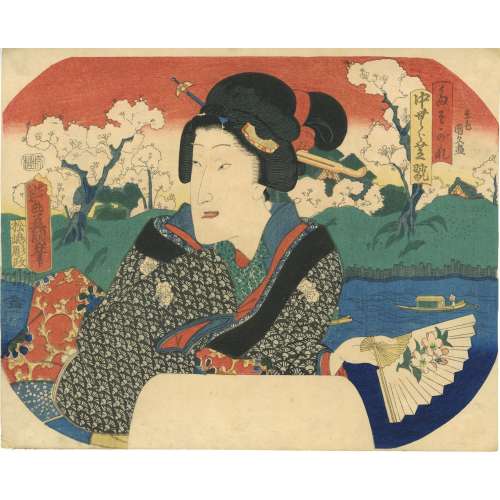 Artist (character): Utagawa Kunisada [歌川 国貞] a.k.a. Utagawa Toyokuni III [三代歌川豊国] (Japanese, 1786 – 1865). Artist (landscape): Utagawa Kunihisa II [歌川国久] (Japanese, 1832 – 1981), a.k.a. Katsuda Hisatarō, Ichiunsai, Ritchōrō, Toyonobu, Yōryūsai, Yōsai. Block carver: Matsushima Masakichi (Japanese, fl. c. 1847-65); seal: [松嶋彫政] – Matsushima Hori Masa (Frieze, 2009: 142) Publisher: Iseya Magobei [伊勢屋孫兵衛] (Japanese, fl. c. 1794 – 1868). Signed: By the brush of Toyokuni at the age of 78 [七十八歳豊国筆] (Nanajūhachi-sai Toyokuni hitsu) – in a red toshidama cartouche (left). Signed: Landscape by Kunihisa [景色 国久画] (Keshiki Kunihisa ga) (right). Actor: Nakamura Shikan IV [中村芝翫] (Japanese, 1831 – 1899); other names: Nakamura Fukusuke I, Nakamura Masanosuke I, Nakamura Komasaburō, Nakamura Tamatarō I. Combined date seal and kiwame censor seal: [亥極] – Bunkyū 3 (1863) Tasogare (literally, twilight] [たそがれ] is a character in the novel Rustic Genji and a role in various kabuki plays. Fake Murasaki’s Rustic Genji [偐紫田舎源氏] (Nise Murasaki inaka Genji) is a literary parody written by Ryutei Tanehiko [柳亭種彦] (Japanese, 1783 – 1842). According to Horst Graebner, this must be a mitate print because there was no known performance of this play in 1863.
Artist (character): Utagawa Kunisada [歌川 国貞] a.k.a. Utagawa Toyokuni III [三代歌川豊国] (Japanese, 1786 – 1865). Artist (landscape): Utagawa Kunihisa II [歌川国久] (Japanese, 1832 – 1981), a.k.a. Katsuda Hisatarō, Ichiunsai, Ritchōrō, Toyonobu, Yōryūsai, Yōsai. Block carver: Matsushima Masakichi (Japanese, fl. c. 1847-65); seal: [松嶋彫政] – Matsushima Hori Masa (Frieze, 2009: 142) Publisher: Iseya Magobei [伊勢屋孫兵衛] (Japanese, fl. c. 1794 – 1868). Signed: By the brush of Toyokuni at the age of 78 [七十八歳豊国筆] (Nanajūhachi-sai Toyokuni hitsu) – in a red toshidama cartouche (left). Signed: Landscape by Kunihisa [景色 国久画] (Keshiki Kunihisa ga) (right). Actor: Nakamura Shikan IV [中村芝翫] (Japanese, 1831 – 1899); other names: Nakamura Fukusuke I, Nakamura Masanosuke I, Nakamura Komasaburō, Nakamura Tamatarō I. Combined date seal and kiwame censor seal: [亥極] – Bunkyū 3 (1863) Tasogare (literally, twilight] [たそがれ] is a character in the novel Rustic Genji and a role in various kabuki plays. Fake Murasaki’s Rustic Genji [偐紫田舎源氏] (Nise Murasaki inaka Genji) is a literary parody written by Ryutei Tanehiko [柳亭種彦] (Japanese, 1783 – 1842). According to Horst Graebner, this must be a mitate print because there was no known performance of this play in 1863. -
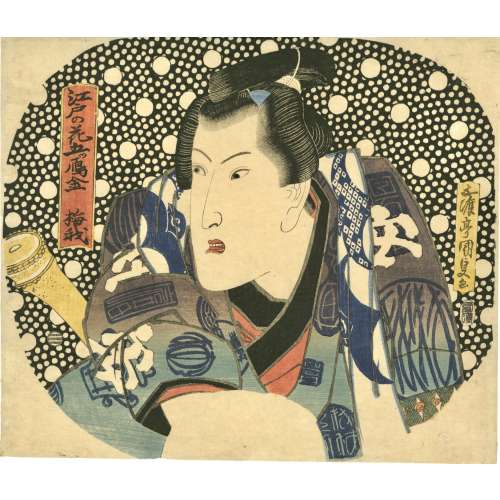 Artist: Utagawa Kunisada, a.k.a. Toyokuni III (Japanese, 1786 – 1865) [歌川 国貞]. Publisher: Ibaya Senzaburō [伊場屋仙三郎] (Japanese, fl. C. 1845 – 1847). Date aratame seal: Bunsei 12 (1829). Signed: Gototei Kunisada ga [五渡亭国貞画]. Media: Fan print (uchiwa-e), 272 x 235 mm. Actor: Iwai Hanshirō VI (Japanese, 1799 – 1836); other names: Iwai Hanshirō VI, Iwai Kumesaburō II, Iwai Hisajirō I, Baiga [梅我] (poetry name), Shūka (poetry name). The background is Arare-ko-mon [霰小紋] hail pattern. Kabuki actor Iwai Kumesaburō II in the role of An no Heibei [安の平兵衛] in the drama Otokodate Itsutsu Karigane [男作五雁金] (Play, 7 acts. Produced 1742/09). From Lyon collection: The real An no Heibei (ca. 1672-1702): "In a gang with Kaitate no Kichiemon, Hote no Ichiemon, Mippiki Jihei and others as of the Seventh Month of 1697. Attacked people with a sword on the sixth day, Seventh Month, 1699, which he then secreted with Kichiemon. On the evening of the sixth day, Sixth Month, 1701, stabbed Kibei, an employee of Kawachiya Gohei of the residential quarter Kyuhoji, in the side with a dagger. A subsequent police investigation resulted in Heibei's arrest the following day. Beheaded at the execution grounds located at Sennichi Mae on the twenty-sixth day of the Eighth Month, 1702." Note: According to Horst Graebner, the actor's name below the series title in the cartouche is Baiga (梅我), the poetry name of Iwai Kumesaburō II. On the other prints in this series, the actors are also named on the other prints with their poetry names. In the red cartouche at the top left is the series title "Edo no hana – itsutsu Karigane" (江戸の花 五雁金), to be translated as "Flowers of Edo - the five Karigane blood-brothers" (or "the five Karigane gang members"). "Since there was no performance with the Karigane brothers from 1829, these must be mitate prints", states Mr Graebner.
Artist: Utagawa Kunisada, a.k.a. Toyokuni III (Japanese, 1786 – 1865) [歌川 国貞]. Publisher: Ibaya Senzaburō [伊場屋仙三郎] (Japanese, fl. C. 1845 – 1847). Date aratame seal: Bunsei 12 (1829). Signed: Gototei Kunisada ga [五渡亭国貞画]. Media: Fan print (uchiwa-e), 272 x 235 mm. Actor: Iwai Hanshirō VI (Japanese, 1799 – 1836); other names: Iwai Hanshirō VI, Iwai Kumesaburō II, Iwai Hisajirō I, Baiga [梅我] (poetry name), Shūka (poetry name). The background is Arare-ko-mon [霰小紋] hail pattern. Kabuki actor Iwai Kumesaburō II in the role of An no Heibei [安の平兵衛] in the drama Otokodate Itsutsu Karigane [男作五雁金] (Play, 7 acts. Produced 1742/09). From Lyon collection: The real An no Heibei (ca. 1672-1702): "In a gang with Kaitate no Kichiemon, Hote no Ichiemon, Mippiki Jihei and others as of the Seventh Month of 1697. Attacked people with a sword on the sixth day, Seventh Month, 1699, which he then secreted with Kichiemon. On the evening of the sixth day, Sixth Month, 1701, stabbed Kibei, an employee of Kawachiya Gohei of the residential quarter Kyuhoji, in the side with a dagger. A subsequent police investigation resulted in Heibei's arrest the following day. Beheaded at the execution grounds located at Sennichi Mae on the twenty-sixth day of the Eighth Month, 1702." Note: According to Horst Graebner, the actor's name below the series title in the cartouche is Baiga (梅我), the poetry name of Iwai Kumesaburō II. On the other prints in this series, the actors are also named on the other prints with their poetry names. In the red cartouche at the top left is the series title "Edo no hana – itsutsu Karigane" (江戸の花 五雁金), to be translated as "Flowers of Edo - the five Karigane blood-brothers" (or "the five Karigane gang members"). "Since there was no performance with the Karigane brothers from 1829, these must be mitate prints", states Mr Graebner. -
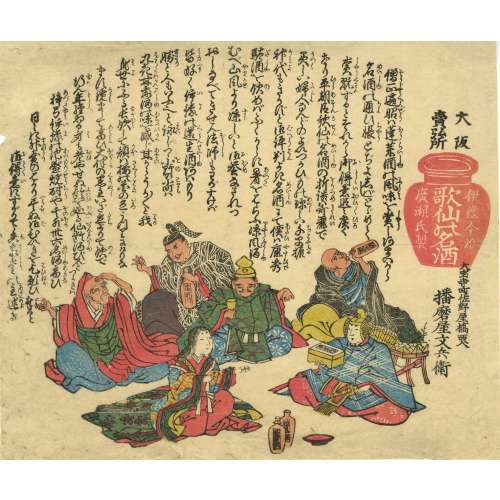 An uncut fan print uchiwa-e, size 22.7 x 28.7cm, by an unknown artist.
An uncut fan print uchiwa-e, size 22.7 x 28.7cm, by an unknown artist. -
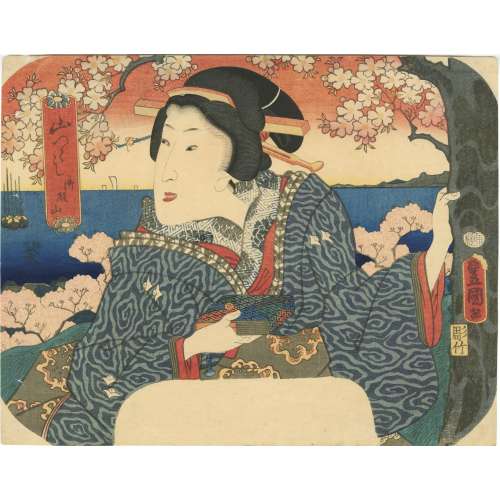 Title: Gotenyama [御殿山] – one of the most popular cherry blossom viewing spots; it is a hill at Shinagawa [品川], the second station on the Tōkaidō road [東海道], located on the shores of Edo Bay [江戸湾]. Series: A Collection of Mountains [山つくし] (Yama tsukushi) Artist: Utagawa Kunisada [歌川 国貞] a.k.a. Utagawa Toyokuni III [三代歌川豊国] (Japanese, 1786 – 12 January 1865). Block carver: Yokokawa Takejirō, seal: [彫竹] – Hori Take. Publisher: Yama-Ta; seal: [板元, 太] – Hanmoto, Ta; Marks 19-044 | U421b: An unknown publisher in Edo, fl. c. 1815-61. Combined date seal and kiwame censor seal: Ansei 6 (1851). Signed: Toyokuni ga [豊国 画] in a red toshidama cartouche. Size: Fan print (uchiwa-e) 227 x 287 mm.
Title: Gotenyama [御殿山] – one of the most popular cherry blossom viewing spots; it is a hill at Shinagawa [品川], the second station on the Tōkaidō road [東海道], located on the shores of Edo Bay [江戸湾]. Series: A Collection of Mountains [山つくし] (Yama tsukushi) Artist: Utagawa Kunisada [歌川 国貞] a.k.a. Utagawa Toyokuni III [三代歌川豊国] (Japanese, 1786 – 12 January 1865). Block carver: Yokokawa Takejirō, seal: [彫竹] – Hori Take. Publisher: Yama-Ta; seal: [板元, 太] – Hanmoto, Ta; Marks 19-044 | U421b: An unknown publisher in Edo, fl. c. 1815-61. Combined date seal and kiwame censor seal: Ansei 6 (1851). Signed: Toyokuni ga [豊国 画] in a red toshidama cartouche. Size: Fan print (uchiwa-e) 227 x 287 mm. -
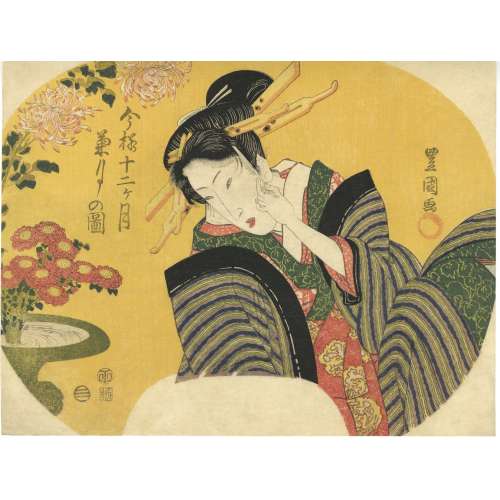 Title: Ninth lunar month [菊月] (Kikuzuki no zu); Series: Fashionable Twelve Months (Imayo juni-kagetsu). Another version of translation: Modern Beauties of Twelve Months. Artist: Utagawa Toyokuni I [歌川豊国] (1769–1825). Pubisher: Ibaya Senzaburō [伊場屋仙三郎] (Japanese, 1815 – 1869), seal: Dansendō [伊場仙]. Signed: Toyokuni ga and sealed with toshidama. Date-kiwame seal: Ushi (ox), Bunsei 5 (1822). Size: double-sheet uncut fan print ( aiban uchiwa-e), 219 x 295 mm.
Title: Ninth lunar month [菊月] (Kikuzuki no zu); Series: Fashionable Twelve Months (Imayo juni-kagetsu). Another version of translation: Modern Beauties of Twelve Months. Artist: Utagawa Toyokuni I [歌川豊国] (1769–1825). Pubisher: Ibaya Senzaburō [伊場屋仙三郎] (Japanese, 1815 – 1869), seal: Dansendō [伊場仙]. Signed: Toyokuni ga and sealed with toshidama. Date-kiwame seal: Ushi (ox), Bunsei 5 (1822). Size: double-sheet uncut fan print ( aiban uchiwa-e), 219 x 295 mm.